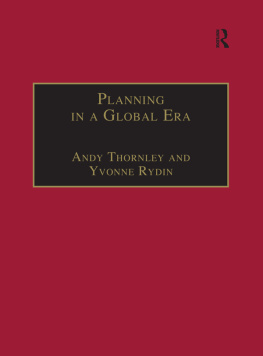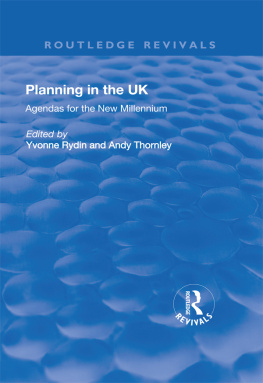First published 2002 by Ashgate Publishing
Published 2016 by Routledge
2 Park Square, Milton Park, Abingdon, Oxon OX14 4RN
711 Third Avenue, New York, NY 10017, USA
Routledge is an imprint of the Taylor & Francis Group, an informa business
Copyright Andy Thornley and Yvonne Rydin 2002
The authors hereby assert their moral right to be identified as the authors of the work in accordance with the Copyright, Designs and Patents Act, 1988.
All rights reserved. No part of this book may be reprinted or reproduced or utilised in any form or by any electronic, mechanical, or other means, now known or hereafter invented, including photocopying and recording, or in any information storage or retrieval system, without permission in writing from the publishers.
Notice:
Product or corporate names may be trademarks or registered trademarks, and are used only for identification and explanation without intent to infringe.
British Library Cataloguing in Publication Data
Planning in a global era. - (Urban and regional planning and development)
1. Regional planning 2. Globalization
I. Thornley, Andy II. Rydin, Yvonne, 1957
307.12
Library of Congress Control Number: 2001095886
ISBN 13: 978-0-7546-1943-7 (hbk)
ISBN 13: 978-1-138-26399-4 (pbk)
Khaled M. Abdelhalim Faculty of the Built Environment, Birmingham School of Architecture, University of Central England.
Mohsen Aboutorabi Professor and Director of Research Studies, Faculty of the Built Environment, Birmingham School of Architecture, University of Central England.
Eva Asplund Department of Infrastructure and Planning, Royal Institute of Technology (Sweden).
Yonn Dierwechter Urban Studies Program WCG, University of Washington, Tacoma (US).
Sylvia Dovln Department of Infrastructure and Planning, Royal Institute of Technology (Sweden).
Wael Fahmi Helwan University.
Bent Flyvbjerg Department of Development and Planning, Aalborg University (Denmark).
Maria Hkansson Department of Infrastructure and Planning, Royal Institute of Technology (Sweden).
Philip Harrison School of Architecture, Housing and Planning, University of Natal.
Joe Howe Department of Planning and Landscape, University of Manchester.
Miguel Jimenez Regional and Urban Planning Studies, London School of Economics.
Eamonn Judge Leeds Business School / Centre of Urban Development and Environmental Management (CUDEM), Leeds Metropolitan University.
Michael Kahn School of Architecture, Housing and Planning, University of Natal.
Terje Kleven Norwegian Institute of Urban and Regional Research (Norway).
John McCarthy Geddes Centre for Planning Research, School of Town and Regional Planning, University of Dundee.
Daniel Mittler International Campaigner at Friends of the Earth Germany (BUND), and Bartlett School of Planning, University College London.
Peter Newman School of the Built Environment, University of Westminster.
Mark Oranje Department of Town and Regional Planning, University of Pretoria.
Yvonne Rydin Reader in Environmental Planning, Director of MSc Environmental Assessment and Evaluation, London School of Economics.
Asato Saito Department of Geography and Environment, London School of Economics.
Bo-Sin Tang Department of Geography and Environment, London School of Economics, and Department of Building & Real Estate, the Hong Kong Polytechnic University.
Andy Thornley Senior Lecturer, Director of MSc Regional and Urban Planning Studies, London School of Economics.
Vanessa Watson School of Architecture and Planning, University of Cape Town.
Murat Cemal Yalcintan Regional and Urban Planning Studies, London School of Economics, and Department of Urban and Regional Planning, Mimar Sinan University.
Ertan Zibel Regional and Urban Planning Studies, London School of Economics.
ANDY THORNLEY AND YVONNE RYDIN
Globalisation as a Process
Globalisation has probably been the most discussed topic in the social sciences over the last decade. It has also been popular with journalists and has featured prominently in newspapers and popular press. The demonstrations in Seattle around the World Trade Organisation meeting, and at subsequent similar events, have given globalisation a high profile. These opposition movements have also illustrated that globalisation is an increasingly contested issue. This collection, drawing contributions from across the world, can itself be seen as an expression of such globalisation. The interchange between planning academics and practitioners is becoming more international and expanding networks of research exchange are being established.
However, defining new analytical concepts precisely is often a tricky process, and globalisation is no exception. A typical definition would be the widening, deepening and speeding up of world wide connectedness in all aspects of social life (Held et al 1999: 2). This is, of course, pitched at a very generalised level and it is when one tries to debate this process in more detail that differences of opinion arise. We can explore some of these debates under five headings, each relating to a different dimension of globalisation: movement and technology; the economy; culture; the environment; and politics.
One of the most obvious manifestations of globalisation and one, which often affects us personally is the increased ease in movement around the world. People as tourists, workers, family members, refugees move around the globe with increased frequency and increased speed. The growth in air travel, and the related fall in cost of such travel, is a major factor in this ease of movement, along with other land-based infrastructure projects such as the Channel Tunnel and high-speed rail links. Migration between countries is now also an established fact of social life, and one that has profound consequences for our social lives and the conduct of national politics (Sassen, 1999). Many governments have considerable difficulty coping with the nationalist and racist tendencies that migration can unleash, and indeed may in some cases embody these tendencies. And it is not only people that are moving around the world with greater ease. Globalisation points to the increased trade in goods across nations. Greater freedom of trade is one of the hegemonic features of contemporary international and national economic policy, as embodied in the GATT rounds, bilateral agreements such as NAFTA and the EU project of the Single European Market.












